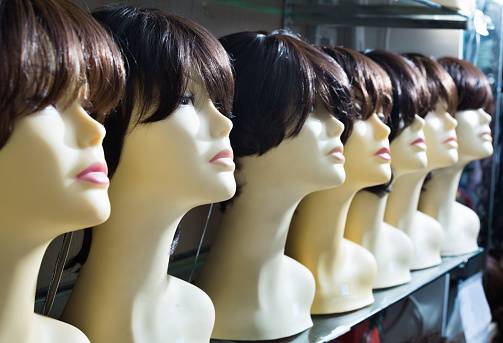
For many black African women, well-groomed hair is a symbol of beauty. But natural hair requires special care and attention, which can be time-consuming. Wigs (human or synthetic), wigs, and other synthetic hair extensions offer women an alternative to natural hair.
In Nigeria, these alternatives are hugely popular with women, young and old. The synthetic hair value chain is a multi-million dollar business run by both local and foreign companies. Beauty salons are thriving, offering styling and grooming services to women.
However, artificial hair has been found to harbor hidden pollutants. Synthetic fibres undergo various chemical treatments to make them look and feel similar to human hair. The raw materials used in the manufacture of some products are toxic. Also, hair care products are mostly made from non-biodegradable plastics, which are harmful to the environment.
A Nigerian study looked at 10 synthetic hair brands commonly worn by women – some made in Nigeria, others in China, Ghana and the US – and found that all brands contained varying levels of contaminants such as silver, cadmium, chromium, nickel, vanadium and lead, as well as several pesticides that are harmful to humans.
Artificial hair is usually worn close to the scalp. Women who wear artificial hair should be aware of the potential harm.
Regulators should ensure that artificial hair manufacturers stop using plastic-based synthetic products and use natural plant fibres and protein blends instead. These hair fibres are biodegradable and free of harmful chemicals.
Our Research
We shopped at the Ariaria International Market in Aba, South-East Abia State for 10 popular synthetic hair brands in various colours: Catherine, Eye Candy, Gold, Calypso, LVH, Dazzler, Mini Bob, Nectar, Diana and X-pression.
The samples were analysed in the laboratory.
We used the U.S. Standard Methods for Testing Water and Wastewater to determine the presence of heavy metals (e.g., cadmium, zinc, lead, chromium, manganese, iron, mercury, copper, and nickel) in the synthetic hair.
Significant amounts of heavy metals were found, one of which, lead, is used to stabilize polyvinyl chloride (PVC), the raw material for artificial hair. Lead compounds (such as lead carbonate, lead stearate, and lead phthalate) prevent the breakdown of PVC due to heat, light, and abrasion, and make it easier to mold.
But lead is dangerous to humans: it affects cell membranes, DNA and antioxidant defense systems, and it interferes with the normal development of a child's brain and nervous system.
The metals used to stabilize the polymer are not bonded to the polymer. Over time or when exposed to light, the metals can leach out. So when women wear synthetic hair as attachments, weave-ons, wigs, headwear, or false eyelashes, they are at risk of exposure to lead and other heavy metals. This is true for all synthetic hair brands that are made from plastic.
In humans, exposure to heavy metals is associated with a variety of biological risks, including damage to the kidneys, liver, lungs, reproductive system and nervous system, as well as cancer, dermatitis, asthma and cardiovascular disease.
The artificial hair samples were also found to be contaminated with 11 chemicals that are pesticides, the concentrations of these chemicals in the hair exceeding permissible limits and posing a health hazard.
These were present in significant quantities, leading us to suspect that the manufacturers were using them as preservatives.
The hair samples we examined also contained high levels of nitrates, which had not been reported in previous studies on synthetic hair. Exposure to high levels of nitrates can cause diseases such as cancer, thyroid enlargement, and methemoglobinemia (a blood disorder).
Why is this important?
Exposure to the toxic chemicals found in artificial hair can have serious health effects. Apart from damage to vital organs, it can cause infertility, birth defects, asthma, bronchitis, and cancer. It can also lead to attention deficit hyperactivity disorder, endocrine disorders, and respiratory diseases.
Anyone using synthetic hair should consider the risks of chemicals and heavy metals, as even low levels can be harmful.
With large-scale synthetic hair manufacturers in Lagos, Nigeria, the National Food and Drug Administration must continually investigate and evaluate the safety of the chemical ingredients used in the manufacture of these products.
There are other options for synthetic hair manufacturers. Instead of plastic fibers, you can use high-quality synthetic fibers such as Hyperlon. You should choose environmentally friendly ones, using fibers that are free of PVC and toxic substances.
Nwan Dikeh Ijere is a Postdoctoral Research Fellow at the Federal University of Technology, Owerri. This article was first published on The Conversation.

